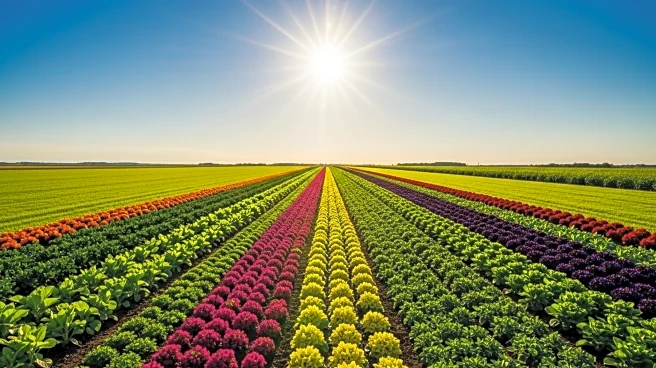What's Happening?
The Food and Agriculture Organization (FAO) has released a report indicating uneven progress towards the 2030 Sustainable Development Goals (SDGs) related to food and agriculture. The FAO oversees 22 indicators across six SDGs, including SDG 2, which focuses on ending hunger, achieving food security, improving nutrition, and promoting sustainable agriculture. The report highlights that about a quarter of these indicators are close to being achieved, while another quarter remains far from being met. Since 2015, performance has deteriorated on more than three-fifths of the indicators, with food insecurity worsening significantly. In 2024, approximately 28% of the global population faced moderate or severe food insecurity, and around 8.2% likely suffered from hunger. The report also notes that food price anomalies have eased but remain significantly higher than pre-2015 levels due to geopolitical conflicts and weather shocks.
Why It's Important?
The FAO's findings underscore the challenges in achieving global food security and sustainable agriculture, which are critical for addressing hunger and malnutrition. The report highlights the need for increased efforts to meet these goals, as current progress is insufficient. The persistence of food insecurity and hunger affects billions of people worldwide, with significant implications for global health and economic stability. The disparities in income between smallholder and larger-scale food producers further exacerbate economic inequalities, particularly in low- and middle-income countries. Additionally, the report's findings on gender disparities in land ownership highlight ongoing social inequalities that need to be addressed to ensure equitable access to resources.
What's Next?
The FAO emphasizes the need to redouble efforts to achieve food security and sustainable agriculture. This includes addressing the underlying causes of food insecurity, such as geopolitical conflicts, climate impacts, and economic tensions. The report suggests that improving water-use efficiency and conserving animal genetic resources are areas where progress can be made. Additionally, addressing gender disparities in land ownership and supporting smallholder farmers are critical steps towards achieving the SDGs. The FAO's call for action highlights the importance of international cooperation and policy interventions to address these complex challenges.
Beyond the Headlines
The FAO report also sheds light on the broader implications of failing to meet the SDGs related to food and agriculture. The ongoing challenges in achieving these goals reflect deeper systemic issues, such as the impact of climate change on agriculture and the need for sustainable resource management. The report's findings on forest cover loss and water stress highlight the environmental dimensions of food security, emphasizing the need for integrated approaches that consider both ecological and social factors. The persistence of gender disparities in land ownership also points to the need for policies that promote gender equality and empower women in agriculture.










